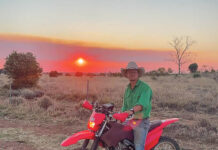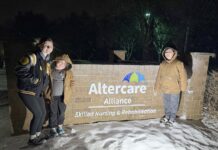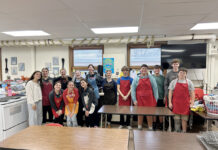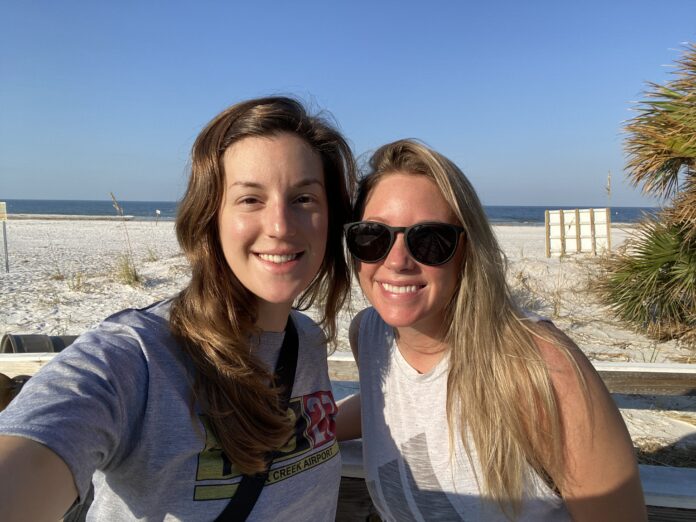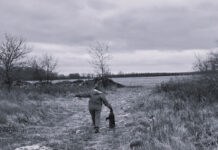Editor’s Note: This is the final part of a series detailing the Hurricane Helene and Hurricane Milton relief efforts of Farm and Dairy Managing Editor Sara Welch and her childhood best friend Jessica Malek.
Dear Herma,
I have dreamt about your house almost every night since returning home. Sometimes, it’s not quite your house. Sometimes, it’s just a house in disrepair, and I wander around it feeling lost, anxious and trapped. Is that how you felt?
I felt like that in your house. I felt lost. How could I help enough? I felt anxious, wondering how you must feel with strangers in your house, hauling out your belongings and debris with no guarantee it will be rebuilt. I felt trapped in the overwhelming emotions I had about all of it.
I still feel a deep sadness for your loss and the uncertainty of your future. I feel guilt over being comfortable in my home and living my life when yours has been turned upside down. I’m angry I haven’t been more involved, using my skills and resources to help others. I’m frustrated there aren’t more answers, and that helping doesn’t feel like enough. I’m also grateful I met you and got to be part of your story.
In the walls of your house, I realized my own privilege. I saw the gap between your life and mine. It made me ashamed of how often I’ve chosen to look away from suffering beyond my own. I see now that you and I are the same. We are human beings doing the best we can with what we have.
Thank you for changing my life. I know the time I spent at your house was not nearly enough to change yours, but it changed me.
Sincerely,
Sara
I’ve tried to sort through my feelings about my disaster relief mission. It’s still difficult to determine how I’m feeling more often than not. My therapist suggested writing the letter above to work through it.
I thought helping in that capacity would always feel good. I was anxious to go. I wanted to do the work. I didn’t understand the chaos a disaster creates. I thought there would be people who would know more than me and would model the right way to help. It wasn’t like that. It was confusing, scary and frustrating at times. Sometimes the amount of pain I felt was overwhelming.
The truth is it’s hard to have compassion without feeling pain, and so I avoid it. But it bubbles to the surface and takes different forms. I get angry. I get depressed. I am grieving if I’m being honest with myself.
Nothing lasts forever, nothing is guaranteed, and anyone’s circumstances could change in an instant. It could all be gone tomorrow. There’s only one way it ends; we die at the end. As different as we may think we are from one another, we all have this in common.
Life seems easier to understand when we believe we can be good enough to deserve the things we have. I have clung to that idea my entire life. But it’s an illusion.
The world is expansive, with billions of unique experiences happening simultaneously. We live and breathe and experience life together.
Being in Herma’s house was living, breathing and experiencing her life. I opened myself up to her pain, and I still feel it now.
No one is returning to rebuild Herma’s house. Jess and I were told Herma’s house would only be rebuilt if volunteers continued to help. We were informed that everyone went home on Nov. 3, just over three weeks after arriving. Herma is on her own.
It doesn’t feel like enough help for Herma and the others reeling from the fallout of Hurricane Helene and Hurricane Milton. Efforts there probably won’t be enough for a long time.
Since coming home, enough, to me, only exists when everyone feels as comfortable in their home as I feel in mine. Sometimes that feels like a bottomless pit. Other times it feels like hope.
I can never do enough. No one of us ever can. But the help you can give can be part of enough. The potential for a better world comes from leaning into the hope that you’re contributing to something greater than yourself.
Help doesn’t have to be perfect or grandiose. It can be clunky, the same way two 35-year-old moms impulsively driving across the country to help with hurricane relief was clunky. It can be awkward like accepting money without a fully formed plan. It can be frustrating, the way dealing with operations in Florida felt. It can be heartwarming and supportive like hugging a stranger at a small airstrip in North Carolina. It can also be transformative and eye-opening like mudding out Herma’s house. It can look however it needs to look to get people the help they need.
We need each other. We need to show up for one another in disasters and daily life. We need to exist with each other in mind, wanting the same kind of life for everyone else that we want for ourselves.
I never imagined a late-night text from my best friend would change my life. Imagine what we can accomplish if we lift each other up in the face of adversity instead of looking away.
Related Content
- Part One: Called to help those impacted by Hurricane Helene
- Part Two: Lending a hand at Lower Creek Airport
- Part Three: Picking up the pieces in St. Petersburg



